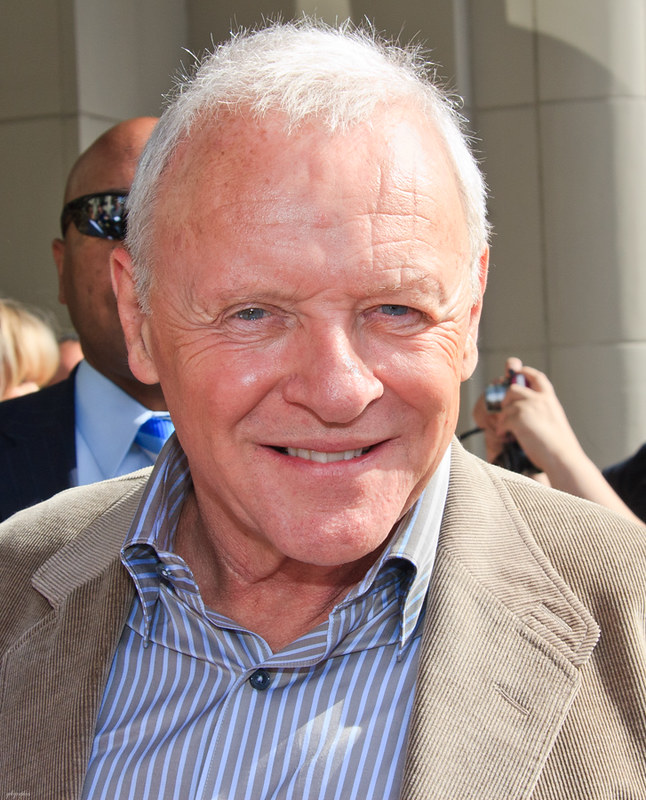‘The Father’: A Look Into the Horrors of Dementia
An Oscar-winning film where reality, something most films revolve around, is not important
GORDON CORRELL VIA FLICKR
Academy Award winner Anthony Hopkins stars in this haunting and tragic film about a father struggling with dementia and his daughter.
May 4, 2021
“The Father” (2020), directed by Florian Zeller, is a film that everyone needs to see. It tackles the utter confusion, anxiety and sadness that suffocates and antagonizes those who have dementia. This is a necessary and timeless film as its subject matter affects millions of people in the world annually.
The topic of dementia is an uncommon subject in film. “The Father” uplifts the voices of those affected by dementia through its excellent performances, production design and screenplay. The film appears to be a drama, but it is really a horror film. It is an extremely scary and most stress-inducing film because the events in the story represent real life for millions. Dementia is like a virus that slowly controls and picks away at one’s reality.
The film follows Anthony (Anthony Hopkins), a father dealing with dementia who slowly deteriorates and loses his grip on reality. Over the course of the film, he refuses to accept help from his daughter, Anne (Olivia Colman), as he regards himself as a man of superior intelligence and memory.
What ensues is a battle of denial and ultimately acceptance as dementia plagues his mind with delusions, memory loss and anxiety.
The horror of the film can be attributed to three distinct parts: the performance of Hopkins, the production design and, finally, the screenplay.
In the beginning of the film, Anthony forgets simple things like where he placed his watch and what time of day it is. By the end, he does not know his own name or where he is. The film becomes a mind game, as not even the audience truly knows what reality is. This is what makes the film so powerful. It aims to put people in the minds of those who have dementia. Deservedly, “The Father” was nominated for six Oscars, including wins for Best Actor and Best Adapted Screenplay.
The horror of the film can be attributed to three distinct parts: the performance of Hopkins, the production design and, finally, the screenplay.
Hopkins turns in one of his finest and most emotionally captivating performances of his career. His performance is emotionally draining, complex and inspiring. At the beginning of the film, his character is full of energy, humor and charm as he denies the truth of his condition by putting on a facade. He doesn’t want to come to terms with the reality that the majority of what he thinks is happening is all in his head. As his condition worsens, he loses the energy he once had, and he starts to become agitated and frustrated. By the end, he has lost his identity and life as he cannot separate reality from delusions.
As the film progresses, Hopkins uses more emotion, and you can see the increased anger building up inside of him through his tense body language and quivering tone. His performance is what powers the film. Through his performance, we see that dementia is much more than memory loss. It usually leads to the loss of reality, time and one’s belief in oneself.
With his Oscar win for Best Actor for “The Father,” Hopkins became the oldest Oscar nominee and winner for Best Actor at the age of 83. This is arguably his best performance since his last Oscar win for the chilling and nightmare-inducing performance as Dr. Hannibal Lecter in “The Silence of the Lambs.”
What seems like reality to Anthony is really all in his head and what does not seem like reality is reality.
The production design of the film is very subtle and minimalistic as the film takes place in an apartment. However, don’t be deceived. The flat is able to capture the mental deterioration of Anthony throughout the film because of its simplicity. The simplicity allows the audience to easily see changes in the flat that reflect the evolution of Anthony’s dementia. If the film was in a larger setting, changes in production design would be less noticeable to the audience, and the symbolism of the setting would be rendered ineffective.
The production and costume teams used the colors blue and red to show the progression of Anthony’s dementia. Usually, blue is associated with ideas of hope, good and even truth. In this film, blue represents Anthony’s delusions. There are few instances where blue is not present.
This use of color is what left me in shock once I understood that it symbolized his delusions. Since the majority of the film has the presence of blue, pretty much everything that was going on in the film is a delusion of Anthony’s. To make matters worse, the few scenes with the presence of red were so different in the dialogue and physical appearance of the flat that these seemed like the delusions of Anthony. This is truly haunting. What seems like reality to Anthony is really all in his head and what does not seem like reality is reality. How can you not be terrified by that?
The Oscar-winning adapted screenplay by Zeller and co-writer Christopher Hampton masterfully uses a subjective perspective. Usually in films that tackle mental diseases or conditions, an objective perspective is used. The audience is an outside viewer who can tell that what the characters are seeing or saying are delusions or off-kilter. However, in “The Father,” a subjective perspective is used as we become a part of Anthony. We can visually see all of his delusions. This is what makes the scenes shocking and powerful because the viewers cannot tell what reality is, just like Anthony.
This unique perspective emphasizes the confusion that comes with dementia, leaving the audience to question everything that happened in the film. That is the point of “The Father” — you are not supposed to understand what is truly reality.
“The Father” offers a much-needed look at dementia, a topic that is often misunderstood or put to the side in society. The film helps people feel what it’s like to have dementia in hopes that people treat it as the serious and common problem that it is. Hopefully, people understand more about dementia and sympathize with those who have it after watching “The Father.”













